Abstract
Although the use of a gene specific deoxyribonucleic acid (DNA) probe is the method of choice for detecting carriers of genes for rare genetic disorders, there will always be families in which such probes cannot be used because key subjects are not informative for restriction fragment length polymorphisms in or around the gene. In these cases closely linked DNA markers have to be used. An X chromosome specific DNA probe, DX13, which is closely linked to the haemophilia A locus on the X chromosome, was used for early prenatal diagnosis in two cases and to detect carriers in a series of nine possible heterozygote women. The first reported crossover between DX13 and the factor VIII:C locus was observed in this study. There are complexities inherent in using any linked DNA probe for assignment of genes, but such techniques are clinically important.
Full text
PDF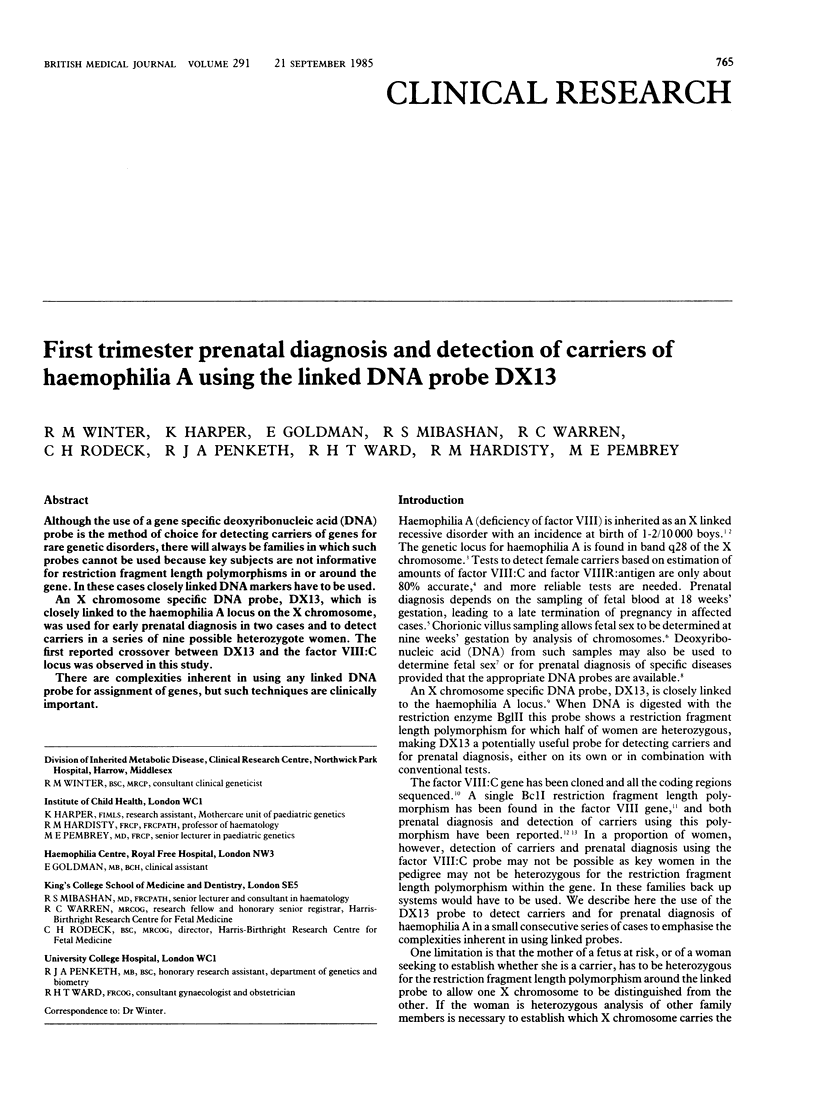
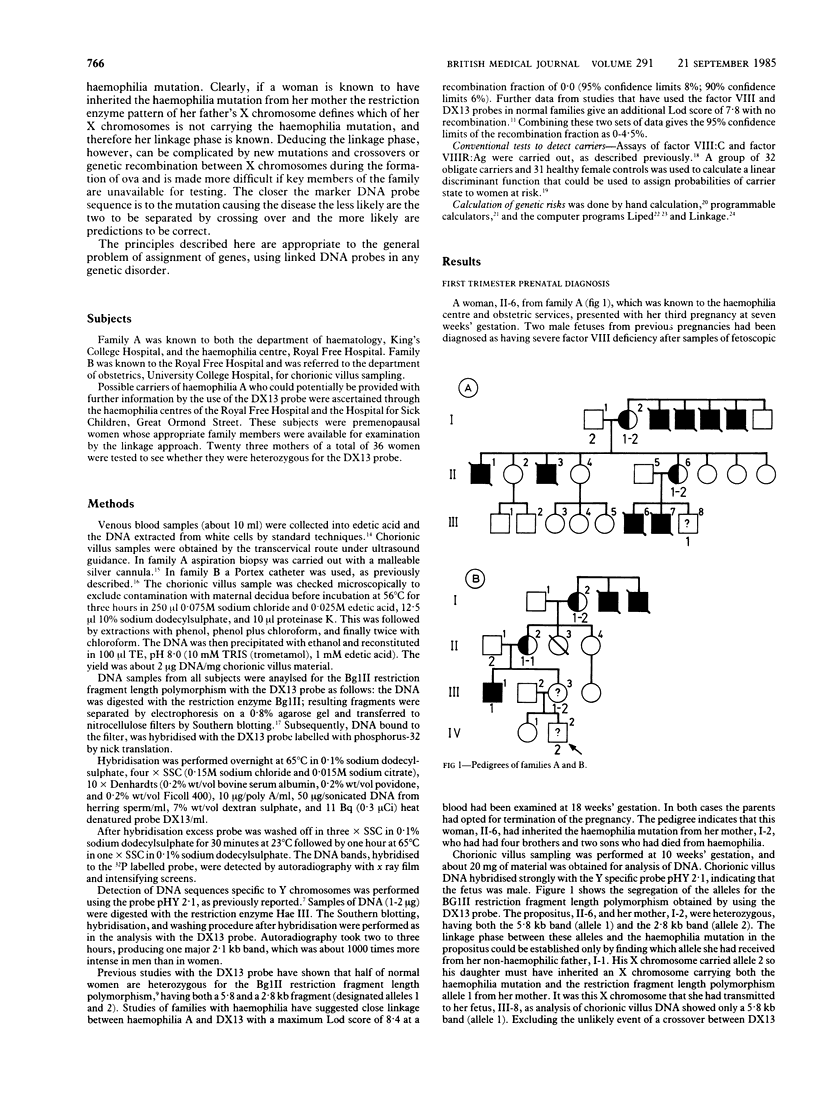
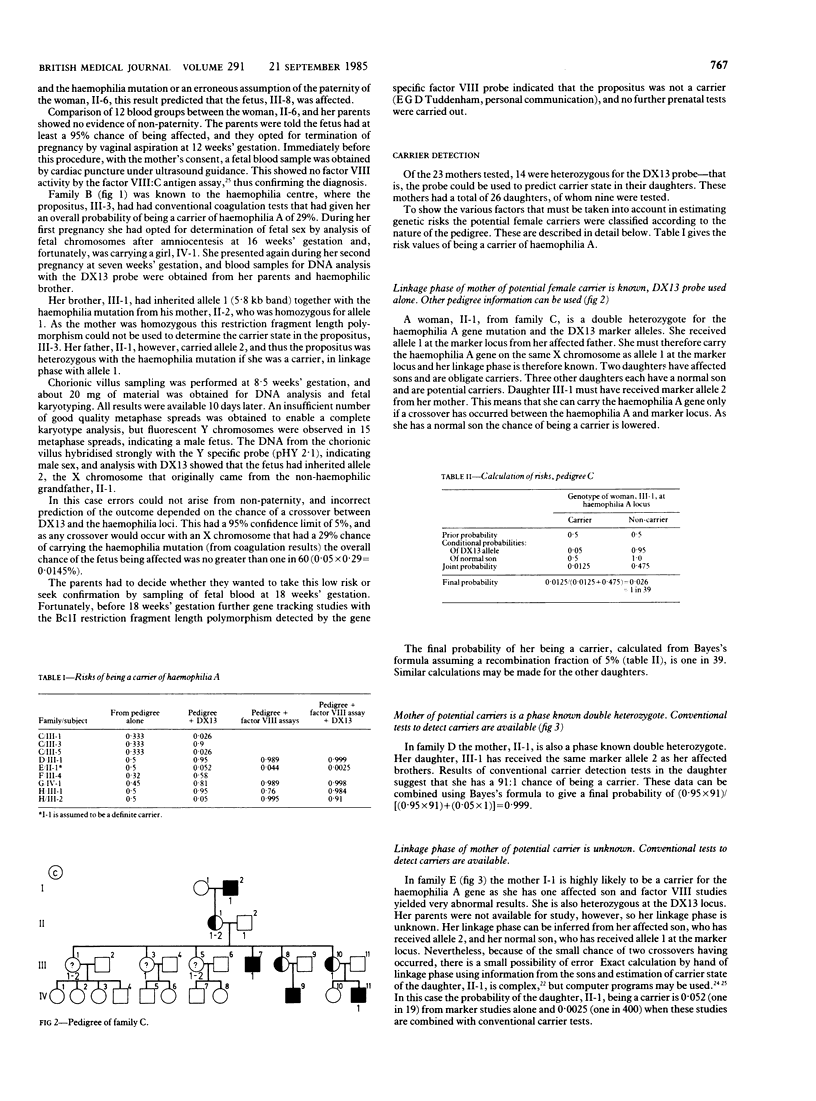
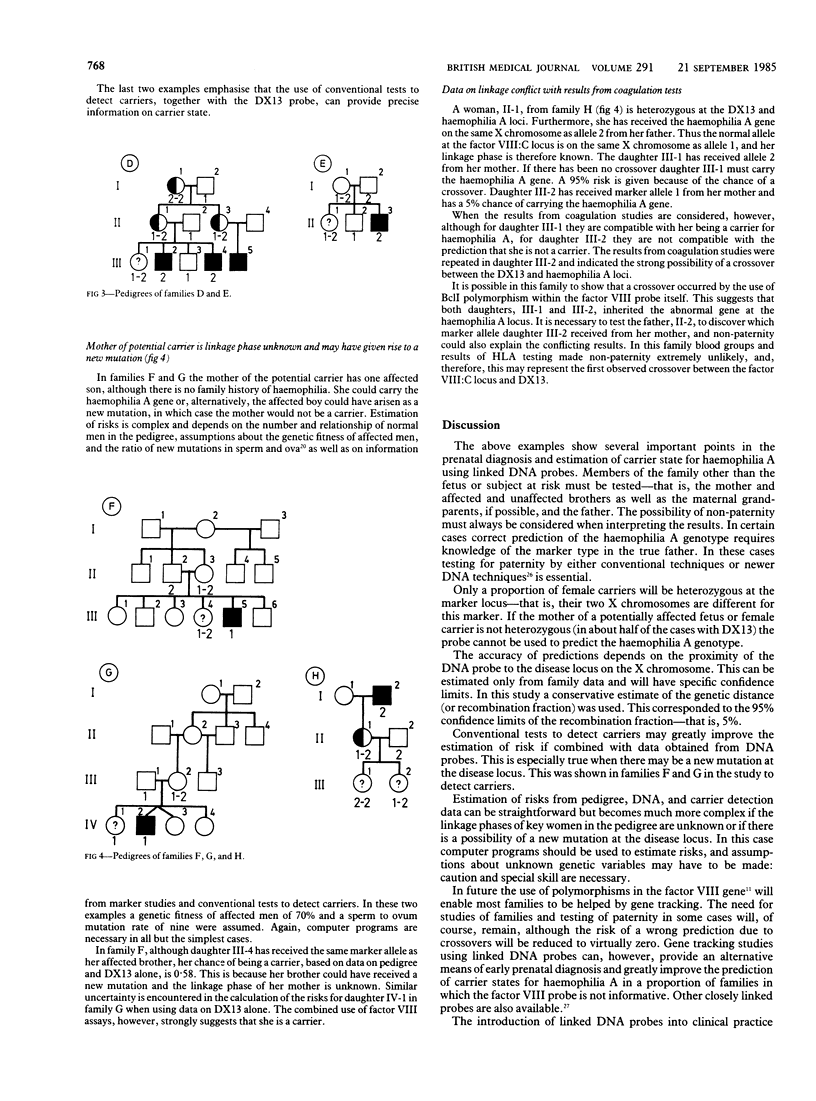
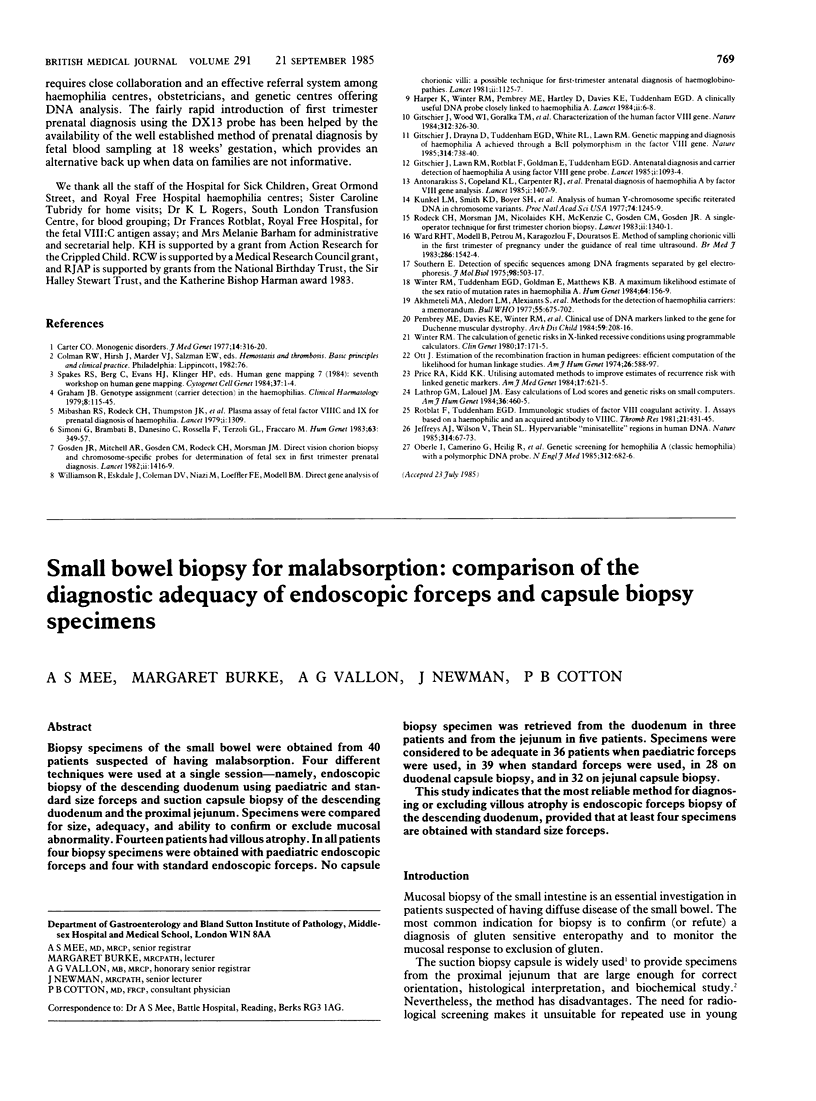
Selected References
These references are in PubMed. This may not be the complete list of references from this article.
- Antonarakis S. E., Copeland K. L., Carpenter R. J., Jr, Carta C. A., Hoyer L. W., Caskey C. T., Toole J. J., Kazazian H. H., Jr Prenatal diagnosis of haemophilia A by factor VIII gene analysis. Lancet. 1985 Jun 22;1(8443):1407–1409. doi: 10.1016/s0140-6736(85)91842-2. [DOI] [PubMed] [Google Scholar]
- Carter C. O. Monogenic disorders. J Med Genet. 1977 Oct;14(5):316–320. doi: 10.1136/jmg.14.5.316. [DOI] [PMC free article] [PubMed] [Google Scholar]
- Gitschier J., Drayna D., Tuddenham E. G., White R. L., Lawn R. M. Genetic mapping and diagnosis of haemophilia A achieved through a BclI polymorphism in the factor VIII gene. 1985 Apr 25-May 1Nature. 314(6013):738–740. doi: 10.1038/314738a0. [DOI] [PubMed] [Google Scholar]
- Gitschier J., Lawn R. M., Rotblat F., Goldman E., Tuddenham E. G. Antenatal diagnosis and carrier detection of haemophilia A using factor VIII gene probe. Lancet. 1985 May 11;1(8437):1093–1094. doi: 10.1016/s0140-6736(85)92388-8. [DOI] [PubMed] [Google Scholar]
- Gitschier J., Wood W. I., Goralka T. M., Wion K. L., Chen E. Y., Eaton D. H., Vehar G. A., Capon D. J., Lawn R. M. Characterization of the human factor VIII gene. Nature. 1984 Nov 22;312(5992):326–330. doi: 10.1038/312326a0. [DOI] [PubMed] [Google Scholar]
- Gosden J. R., Mitchell A. R., Gosden C. M., Rodeck C. H., Morsman J. M. Direct vision chorion biopsy and chromosome-specific DNA probes for determination of fetal sex in first-trimester prenatal diagnosis. Lancet. 1982 Dec 25;2(8313):1416–1419. doi: 10.1016/s0140-6736(82)91325-3. [DOI] [PubMed] [Google Scholar]
- Graham J. B. Genotype assignment (carrier detection) in the haemophilias. Clin Haematol. 1979 Feb;8(1):115–145. [PubMed] [Google Scholar]
- Harper K., Winter R. M., Pembrey M. E., Hartley D., Davies K. E., Tuddenham E. G. A clinically useful DNA probe closely linked to haemophilia A. Lancet. 1984 Jul 7;2(8393):6–8. doi: 10.1016/s0140-6736(84)91995-0. [DOI] [PubMed] [Google Scholar]
- Jeffreys A. J., Wilson V., Thein S. L. Hypervariable 'minisatellite' regions in human DNA. Nature. 1985 Mar 7;314(6006):67–73. doi: 10.1038/314067a0. [DOI] [PubMed] [Google Scholar]
- Kunkel L. M., Smith K. D., Boyer S. H., Borgaonkar D. S., Wachtel S. S., Miller O. J., Breg W. R., Jones H. W., Jr, Rary J. M. Analysis of human Y-chromosome-specific reiterated DNA in chromosome variants. Proc Natl Acad Sci U S A. 1977 Mar;74(3):1245–1249. doi: 10.1073/pnas.74.3.1245. [DOI] [PMC free article] [PubMed] [Google Scholar]
- Lathrop G. M., Lalouel J. M. Easy calculations of lod scores and genetic risks on small computers. Am J Hum Genet. 1984 Mar;36(2):460–465. [PMC free article] [PubMed] [Google Scholar]
- Methods for the detection of haemophilia carriers: a memorandum. Bull World Health Organ. 1977;55(6):675–702. [PMC free article] [PubMed] [Google Scholar]
- Mibashan R. S., Rodeck C. H., Thumpston J. K., Edwards R. J., Singer J. D., White J. M., Campbell S. Plasma assay of fetal factors VIIIC and IX for prenatal diagnosis of haemophilia. Lancet. 1979 Jun 23;1(8130):1309–1311. doi: 10.1016/s0140-6736(79)91946-9. [DOI] [PubMed] [Google Scholar]
- Oberle I., Camerino G., Heilig R., Grunebaum L., Cazenave J. P., Crapanzano C., Mannucci P. M., Mandel J. L. Genetic screening for hemophilia A (classic hemophilia) with a polymorphic DNA probe. N Engl J Med. 1985 Mar 14;312(11):682–686. doi: 10.1056/NEJM198503143121103. [DOI] [PubMed] [Google Scholar]
- Ott J. Estimation of the recombination fraction in human pedigrees: efficient computation of the likelihood for human linkage studies. Am J Hum Genet. 1974 Sep;26(5):588–597. [PMC free article] [PubMed] [Google Scholar]
- Pembrey M. E., Davies K. E., Winter R. M., Elles R. G., Williamson R., Fazzone T. A., Walker C. Clinical use of DNA markers linked to the gene for Duchenne muscular dystrophy. Arch Dis Child. 1984 Mar;59(3):208–216. doi: 10.1136/adc.59.3.208. [DOI] [PMC free article] [PubMed] [Google Scholar]
- Price R. A., Kidd K. K. Utilizing automated methods to improve estimates of recurrence risk with linked genetic markers. Am J Med Genet. 1984 Mar;17(3):621–625. doi: 10.1002/ajmg.1320170311. [DOI] [PubMed] [Google Scholar]
- Rodeck C. H., Morsman J. M., Nicolaides K. H., McKenzie C., Gosden C. M., Gosden J. R. A single-operator technique for first-trimester chorion biopsy. Lancet. 1983 Dec 10;2(8363):1340–1341. doi: 10.1016/s0140-6736(83)91095-4. [DOI] [PubMed] [Google Scholar]
- Rotblat F., Tuddenham E. G. Immunologic studies of factor VIII coagulant activity (VIII:C) 1. Assays based on a haemophilic and an acquired antibody to VIII:C. 1981 Feb 15-Mar 1Thromb Res. 21(4-5):431–445. doi: 10.1016/0049-3848(81)90144-4. [DOI] [PubMed] [Google Scholar]
- Southern E. M. Detection of specific sequences among DNA fragments separated by gel electrophoresis. J Mol Biol. 1975 Nov 5;98(3):503–517. doi: 10.1016/s0022-2836(75)80083-0. [DOI] [PubMed] [Google Scholar]
- Ward R. H., Modell B., Petrou M., Karagözlu F., Douratsos E. Method of sampling chorionic villi in first trimester of pregnancy under guidance of real time ultrasound. Br Med J (Clin Res Ed) 1983 May 14;286(6377):1542–1544. doi: 10.1136/bmj.286.6377.1542. [DOI] [PMC free article] [PubMed] [Google Scholar]
- Williamson R., Eskdale J., Coleman D. V., Niazi M., Loeffler F. E., Modell B. M. Direct gene analysis of chorionic villi: A possible technique for first-trimester antenatal diagnosis of haemoglobinopathies. Lancet. 1981 Nov 21;2(8256):1125–1127. doi: 10.1016/s0140-6736(81)90583-3. [DOI] [PubMed] [Google Scholar]
- Winter R. M. The calculation of genetic risks in X-linked recessive conditions using programmable calculators. Clin Genet. 1980 Feb;17(2):171–175. doi: 10.1111/j.1399-0004.1980.tb00128.x. [DOI] [PubMed] [Google Scholar]
- Winter R. M., Tuddenham E. G., Goldman E., Matthews K. B. A maximum likelihood estimate of the sex ratio of mutation rates in haemophilia A. Hum Genet. 1983;64(2):156–159. doi: 10.1007/BF00327115. [DOI] [PubMed] [Google Scholar]


